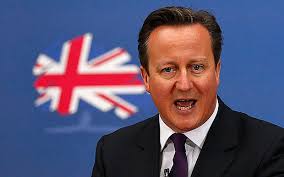Prime Minister David Cameron is to step down by October after the United Kingdom (UK) voted to leave the European Union (EU).
Speaking outside 10 Downing Street, he said “fresh leadership” was needed.
The PM had urged the country to vote Remain but was defeated by 52% to 48% despite London, Scotland and Northern Ireland backing staying in.
UKIP leader, Nigel Farage, hailed it as the UK’s “independence day”, while Boris Johnson said that the result would not mean “pulling up the drawbridge”.
Minister Nicola Sturgeon said that she was “absolutely determined” to keep Scotland in the EU so a second Scottish independence referendum was now “highly likely”.
EU chiefs said that they expected the UK to begin negotiations to leave “as soon as possible, however painful that process may be”.
But Boris Johnson, the ex-London mayor and public face of Vote Leave who is now a frontrunner to be next prime minister, said there was “no need for haste” about severing the UK’s ties.
He said voters had “searched in their hearts” and the UK now had a “glorious opportunity” to pass its own laws, set its own taxes and control its own borders. Another leading Leave campaigner, Labour’s Gisela Stuart, said the UK would be a “good neighbour” when it left the EU.
The pound fell to its lowest level against the dollar since 1985 as the markets reacted to the results.
Flanked by his wife Samantha, Mr Cameron announced shortly after 08:15 BST that he had informed the Queen of his decision to remain in place for the short term and to then hand over to a new prime minister by the time of the Conservative conference in October.
He would attempt to “steady the ship” over the coming weeks and months, but that it would be for the new prime minister to carry out negotiations with the EU and invoke Article 50 of the Lisbon Treaty, which would give the UK two years to negotiate its withdrawal, he said.
“The British people have voted to leave the European Union and their will must be respected,” said Cameron. “The will of the British people is an instruction that must be delivered.”
Meanwhile, stock markets crashed, oil prices tumbled and the pound fell to a 31-year low on Friday as Britain’s unprecedented vote to leave the European Union shocked investors and dragged the region, the world’s largest economic bloc, into a new era of uncertainty.
Investors rushed to dump European shares as soon as markets opened, following earlier drops in Asia, and Wall Street was set to fall sharply amid concerns about the economic consequences of the vote. The move could drain confidence among companies and business in Britain and the wider EU, which some fear could even face more defections.
Britain’s FTSE 100 plunged about 8 percent but recovered slightly for a 5 percent loss. The German index tanked 10 percent, which would be its biggest one-day decline ever, and France’s index tumbled about 7 percent. Wall Street was due to open sharply lower, with Dow and S&P 500 futures down 2.4 percent and 3.2 percent.
The pound hit its lowest level since 1985, diving as much as 11 percent before recovering slightly to trade 6 percent lower at $1.3917. Oil prices crashed, with the U.S. benchmark diving $1.95 to $48.16 a barrel. The Nikkei 225 plummeted about 8 percent, its biggest fall since 2008.
The result of the vote, which trickled in when Asian markets were trading, caught investors by surprise. Markets had rallied on Thursday on hopes for a “remain” vote and bookies had given such an outcome a high probability of success.
“You can see people are running for cover,” said Ken Courtis, chairman of Starfort Investment Holdings in Tokyo. Investors were betting on a victory for the “remain” side, but “what you’re seeing now in markets is an adjustment in the other direction, as everyone tries to get through a tiny door at the same time,” he said.
Britain’s decision to leave the EU launches what will be years of negotiations over trade, business and political links with the EU, which will shrink to a 27-nation bloc. Above all, it creates uncertainty, which is toxic to businesses looking to making investments or consumers looking to make purchases.
It could also threaten London’s position as one of the world’s pre-eminent financial centers as professionals could lose the right to work across the EU. The U.K. hosts more headquarters of non-EU firms than Germany, France, Switzerland and the Netherlands put together.
The Bank of England said it had made contingency plans for a “leave” vote and promised to take action to maintain stability. It noted that it has 250 billion pounds ($342 billion) in liquidity available for banks. “We are well prepared for this,” the bank’s governor, Mark Carney, said in a televised statement.
That seemed to help confidence somewhat, particularly in financial stocks, which were among the hardest hit. Shares in Barclays bank in London had tanked as much as 30 percent before settling for a 14 percent drop.
Banks have the most to lose in Britain’s departure from the EU as they do a lot of cross-border activity, which is facilitated in the EU, which has no borders, tariffs, or limits on the movement money and people.
Japan’s Nikkei 225 finished the wild day at 14,952.02 down 7.9 percent while South Korea’s Kospi sank 3.1 percent to 1,925.24, its biggest fall in four years. Hong Kong’s Hang Seng index tumbled 4.4 percent to 19,942.90 and Australia’s S&P/ASX 200 fell 3.2 percent to 5,113.20. Stocks in Shanghai, Taiwan, Sydney, Mumbai and Southeast Asian countries were sharply lower.
“Financial markets throughout the night have been chaotic to say the least,” said Craig Erlam, senior market analyst at Oanda in London. “All eyes will now be on central banks around the world to see how they respond to these market developments, particularly the Bank of England and the Bank of Japan.”
In other currencies, the dollar fell to 102.98 yen from 104.80 yen while the euro weakened to $1.1123 from $1.1320.
.AP















